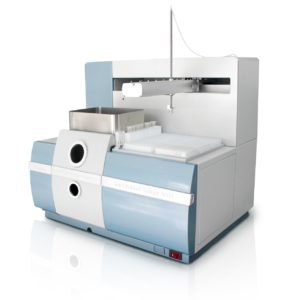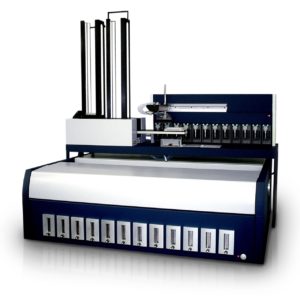The importance of drug safety issues in the pharmaceutical industry has created a need for increased high-throughput drug screening for ion channel sensitivity early in the drug discovery process. For instance, drug-induced QT-prolongation and cardiac arrhythmias have resulted in the emergence of the S7B and E14 guidance documents for drug safety assessment. Early detection of such risks helps direct focus towards potentially marketable drugs and prevents the investment of time and resources in drugs which will not pass the rigorous testing required for approval. New technologies and resources for high-throughput screening during early drug discovery phases continue to revolutionize the marketplace and promise to decrease bottlenecks while increasing output. As drugs go off-patent and pharmaceutical companies strive to find novel therapeutic solutions, automation of high-throughput drug screening equipment will continue to lower costs and improve efficacy and drug safety.
The Importance of Ion Channels
Ion channel dysfunction has been implicated in a number of diseases and disorders, including cystic fibrosis, diabetes, erectile dysfunction, epilepsy, heart failure, hypertension, muscular sclerosis, obesity, schizophrenia, and sickle cell anemia. As a result, over 6 billion dollars in yearly sales and 15% of the top-selling drugs are targeted at ion channels. In addition, over 500 human ion channel genes have been identified, yet only around 40 have been targeted for therapeutic effects. This suggests that the field of ion channel drug discovery will continue to attract ion channel researchers.
Applications
Although voltage clamp is the gold standard for recording ion channel activity with a high temporal resolution, this method can be expensive and technically challenging. Moreover, electrophysiological techniques are not ideal for screening ion transporters, which are therapeutically important but can have little to no measurable current. Aurora’s Ion Channel Reader (ICR) series instruments combine atomic absorption spectroscopy with a patented microsampling process to accurately measure ion flux in cell-based screening assays. ICR technology has been widely used for high throughput screening of both voltage-gated and ligand-gated channels and offers high sensitivity, generating accurate drug rank order matching electrophysiology data. More recently, flux-based screening has begun to be applied to the study of ion pumps and transporters. Using the principles of atomic absorbance spectroscopy to measure the absolute concentrations of cytosolic and extracellular ions, this technique is one of the only methods capable of obtaining high throughput activity measurements for electro-neutral ion transporters. Aurora’s ICR instruments provide an alternative approach to the ion channel and transporter screening that is independent of, and complementary to, methods that rely on voltage manipulation.
Research applications of the ICR 8000 and ICR 12000 include:
- Voltage-gated potassium channels, including hERG, Kv1.1, Kv1.4, and Kv1.5
- Stretch-activated potassium channels
- Voltage-gated sodium channels including, Nav1.2, Nav1.5, and Nav1.7
- Ligand-gated channels including GABAA, P2X, KATP, SKCa, BKCa, and nAChR
- Transporters including Na/K-ATPase and the Cation-Cl Co-Transporter (CCC)
Aurora Biomed’s Ion Channel Reader technology is not limited to ion channel targets expressed in cells but also works well with synthetic vesicles constituted in the presence of ion-transporting channels or pore-forming proteins.

Aurora Biomed’s annual Ion Channel Retreat keeps the drug discovery community apprised of recent trends and developments in the field of ion channel research. Since the inaugural meeting in 2003, this yearly conference has consistently provided an environment for researchers and industry leaders to exchange ideas, discuss future collaborations, and consider future research proposals and trends.




